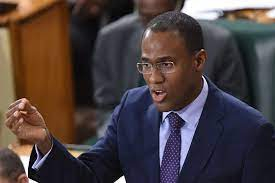More questions have arisen about the quality of oversight state regulator, the Financial Services Commission (FSC), gave to the now-fraud-hit Stocks and Securities Limited (SSL) as a 2019 assessment revealed that a string of violations flagged more than two years earlier continued to dog the institution.
Those revelations, cited in two pages from the 2019 report posted on Twitter Sunday by Finance Minister Dr Nigel Clarke, suggest that the “problem institution” may have failed to sufficiently change the fundamentals that FSC staff uncovered, even though the regulator eventually branded SSL compliant and revoked the notice of intention to suspend its licence in August 2017.
Public sentiment has turned against the FSC because investors – and the public at large - were unaware of the “culture of non-compliance and mismanagement of clients’ funds” mentioned in the 2017 report, with SSL now under domestic and international investigations for an alleged $3-billion fraud.
Clarke, who disclosed in a newspaper op-ed on Saturday that the 2019 examination of SSL had reportedly been unreviewed and buried in the cabinets of the finance ministry since 2020, has received flak from the Opposition for being derelict.
Transparency lobby, The Advocates Network, has also called for the full 2019 report to be published.
The FSC’s examination of SSL’s books led to the regulator giving the securities dealer a Stage 31 rating – meaning that the future financial viability of the company was in serious doubt. The integrity of its financials was also questioned.
Additionally, the report raised concerns about the adequacy of securities to cover clients’ obligations, as well as the magnitude of operational risk faced by SSL because of poor record keeping and apparent deficits in its management oversight.
The lack of up-to-date and comprehensive policies and procedures to guide the company’s daily operations were also flagged by the FSC. The report also pointed to significant shortfalls between the liquid funds held in bank accounts and the client funds held in cash by SSL. This, it said, would suggest that clients’ funds held in cash by SSL were used to fund its daily operations, resulting in the deficit.
The report also flagged discrepancies in SSL’s explanation for a shortfall which the company claimed was linked to reconciliation issues arising from migration to the new operating system.
“It is noted that the violations and concerns noted for this targeted examination are similar to those noted in the examination conducted on SSL in 2016. This would suggest that inadequate management and board oversight are being placed on the areas found to be in violations and concerns,” an excerpt from the 2019 report said.
It was recommended that SSL be directed to refrain from conducting new securities business with current or prospective clients until the FSC was satisfied that liabilities were adequately covered by appropriate securities.
An FSC-approved auditor should also have been employed to verify off-balance sheet assets to cover clients liabilities, and SSL was also to verify its liquid assets position.
SSL was also instructed to verify that client funds held in cash on the balance sheet in excess of $1.1 billion were not commingled by the investment firm.
Clarke, in his op-ed, said that the FSC board implemented directions “that were more extensive than the directions recommended in the report in both scope and detail”, adding that a status update confirmed that SSL was compliant or largely compliant with five of the six FSC board-mandated directives by April 25, 2020.
But the frequency with which SSL fell into non-compliance and its history of chronic management deficits may raise doubts about how tough the FSC was on the beleaguered entity and whether SSL may have only papered over the cracks for short periods.
There is also uncertainty over whether the finance ministry may have received the 2017 FSC report and whether it, too, may have been misplaced amid reams of documents.
Clarke said at last Monday’s policy speech press conference that concerns regarding SSL’s state had never been raised with him. He also revealed that his predecessor, Audley Shaw, made the same claim privately.
Shaw declined comment, when questioned while leaving an event last week, on whether he had received the 2017 report. Shaw has not answered his phone since.
Everton McFarlane, the executive director of the FSC from 2017 and who will demit office on Tuesday, also declined to answer queries about whether the regulator had sent the 2017 report to the finance ministry.
Robert Stephens, a spokesperson of The Advocates Network, said the matter of important unreviewed documents is “a very serious matter”.
“I would think that it would have been brought to his attention, and for him to say that he really never saw it before sounds a little strange. However, who am I to question his integrity?” Stephens said of Clarke.
“It appears as if they reached a very crucial point in 2017, and since then actions have not been taken that would indicate how serious it was. So people who have been putting money in there were not warned,” Stephens added.
The Opposition People’s National Party, meanwhile, has criticised Clarke as being “negligent” in his oversight responsibilities as the minister in charge of the FSC and Jamaica’s financial system.
The finance ministry received the June 2019 report on April 15, 2020, months after the directives had reportedly been imposed on SSL.
“It is unacceptable for the minister to say he did not read this report, given the critical supervisory role played by the FSC in the financial services industry, and his overall responsibility as minister. This is one of the most important agencies that report to the minister, and their reports to him should have been treated as a priority,” Opposition Spokesman on Finance Julian Robinson said.

